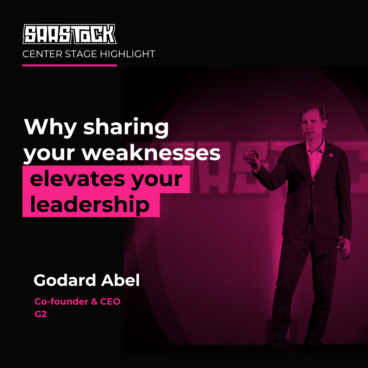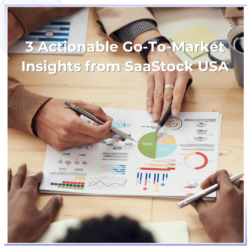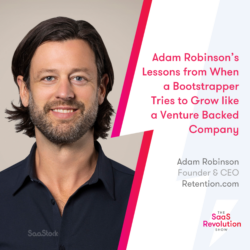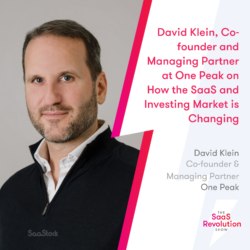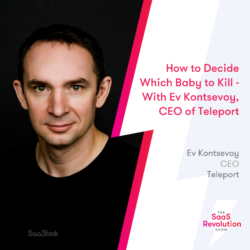The Centre Stage content at SaaStock Europe is designed to unpack some of the biggest SaaS success stories and reveal more about the people behind the headlines.
This session from seven-time SaaS entrepreneur and G2 CEO and Co-founder Godard Abel is one of the most candid. In it, he shares his entrepreneurial journey, highlighting how sharing your weaknesses can strengthen leadership:
“Sharing your weaknesses, sharing your flaws (and I do have many) one, I think it makes me feel better. And two, I think it can help you connect better to your team, your customers, and the community.”
The importance of such openness made clear by some opening stats:
- “Only 20% of SaaS companies survive their first five business years.” (Source: McKinsey & Company)
- “…founders are 50% more likely to suffer from conditions like anxiety, depression, and substance use disorders.” (Source: National Institute of Mental Health)
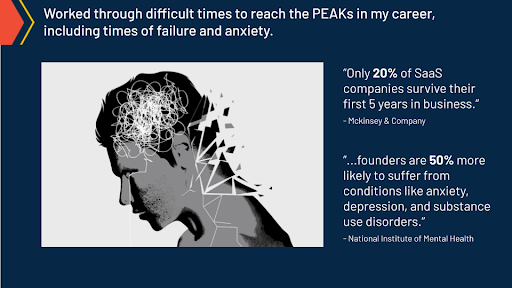
Here are five key takeaways from the rest of the talk:
1. Embrace the ups and downs
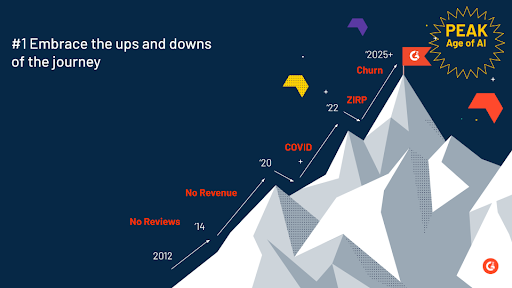
Today, G2 serves more than 90 million annual users, including employees at all Fortune 500 companies. But success wasn’t linear.
“In entrepreneurship, I found it’s this constant up and down. One moment you’re euphoric, you’re a unicorn builder, you’re a genius, and then the next moment you’re an idiot that overexpanded, overinvested, and had to stop doing something. And so, you know, what have I learned through all this? …You have to embrace the ups and downs.”
G2 launched in 2012, alongside Godard’s previous business SteelBrick. Recognising that, at the time, he “wasn’t the leader G2 needed, he stepped back to oversee the SteelBrick’s acquisition by Salesforce, while Co-founder Tim Handorf took over.
By 2020, Godard was back at the helm. That year, the company scaled from 100 to 400 people and opened a new Chicago office. Like many during that time, they scaled too fast and layoffs followed. The timing: opening a lavish new office, shortly followed by company wide layoffs, and a PPP loan application (that was never taken), didn’t sit right for many and resulted in the below Business Insider article.
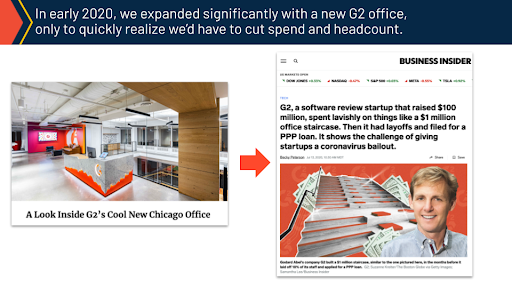
“…Needless to say, it was not flattering. And those moments are tough. But [Jeff Bezos] says, as a leader, it’s part of the job. You deserve to be criticised because…we control our resources. So when we’re not doing our job well, we actually deserve the criticism, although it’s hard to take.”
Through the downs, things started to look up. The tough changes and the accelerated rate of digital transformation during the pandemic led to significant growth and G2 became a unicorn in 2021.
After incredible highs in 2021-G2 felt the impact of the 2022/2023 downturn. In Godard’s words their pipeline “melted down” and they had to refocus.
Skip to this year and G2 is efficient, cash flow positive, and still growing. Godard is confident that its AI product Monty and the impact of AI on the industry as a whole can accelerate that growth further over the next few years. (G2’s Monty also made the shortlist for Most Innovative use of AI at this year’s SaaStock Awards!)
2. Persevere by staying committed to your values and vision
Godard started his first company Big Machines in 2000. Off to a great start, the company raised $20M and scaled to 70 people in its first year during the dot-com boom. However, a year later “the dot-com boom became a dot-com bust” and by 2003 they’d burned through $19 million. With only $1 million annual revenue and persistent missed sales targets, they were forced to lay off 50 of their 70 employees.
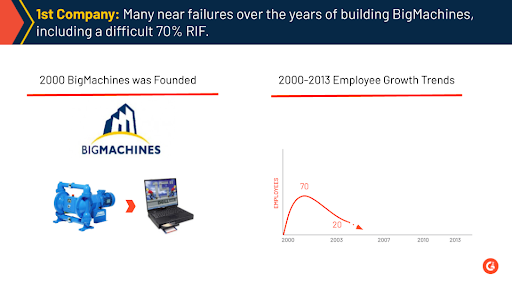
During this time, Godard’s wife was pregnant with twins and gave birth prematurely. It’s a time filled with “anxieties, fears, and doubts”. On the business side, he’d recruited friends from MIT and his father had been an early investor, which added extra pressure. At this point in his career, he didn’t know how to manage this level of stress and it led to what he describes as a “storm cloud” in his head.
But even in these darkest of times, Godard and Co-founder Chris chose to persevere, through to finding PMF in 2007, and a later acquisition by Oracle.
This perseverance made the journey at his next companies look different. At G2 there is a culture of perseverance embedded across the business, using Chip Conley’s PEAK methodology as company values.
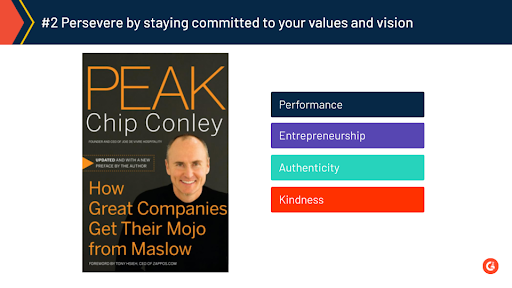
3. Build strong work and family relationships to support you
Godard was clear that he wouldn’t be where he is today without people supporting him throughout his entrepreneurial journey.
He mentioned that having co-founders helps carry him through and stressed the importance of founders recognising each other’s strengths. He used handing over to his Co-founder in the early days at G2 as an example:
“I realised I wasn’t the right leader because at Big Machines, I’d become more of a go to market revenue leader. And G2 really needed more time just to incubate the product, to get the reviews, the buyer traffic, to get the relevance…And Tim did that much better than I did. Sometimes also as a leader, it’s realising what you’re good at. And G2 was actually too early for me.”
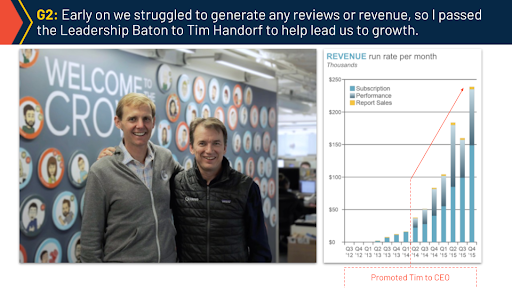
Godard also spoke about his family. His twins, now sophomores in college and his daughter a senior in high school. He attributes his family support to staying grounded, in particular the unwavering support of his wife.
4. Commit to being a conscious leader
Godard has used the principles of conscious leadership to reframe some of the challenges he’s faced as a Founder and CEO. Working with coach and conscious leadership guru Jim Dethmer, one of the most valuable lessons has been understanding that “everything is a choice”.
“I’m choosing to be an entrepreneur. So, even if I’m delayed, stuck in Heathrow for 10 hours, which happens, and sometimes you’re like, why the hell am I doing this? Why am I not home with my family? But then you remember, one, I chose this. And two, you remember your greater purpose and vision and then you can reframe it. No, I’m choosing to be here and I can still enjoy it even when it seems to suck.”

5. Take care of your physical, mental, and spiritual health
Godard’s journey led him to recognise that personal wellbeing is fundamental to sustainable leadership, marking a significant shift from the “storm cloud” in the early days at Big Machines.
“It’s more how you take care of yourself mentally, spiritually, physically that puts you in a place to be happy or not, regardless of the results.”
He now maintains a strict daily practice he calls “peak physical, spiritual, mental time,” blocking an hour in his calendar every day for activities like running, biking, or, since moving to Colorado, climbing snowy peaks in winter.
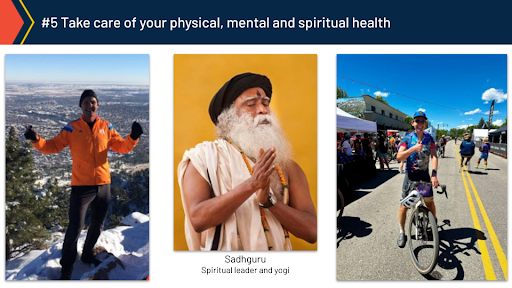
He’s also been influenced by Sadhguru’s book “Inner Engineering,” which led him to the realisation that happiness isn’t necessarily tied to achieving business goals, but rather to how well you engineer yourself for happiness through mental, spiritual, and physical care.
Recommended media
It was a pleasure to welcome Godard and G2 back as SaaStock Europe Partners. The honestly and vulnerability in talk is why we do what we do with out events, community, and content.
Read and watch more inspiring founder stories below:
- Biggest Learnings From Building Optibus to a Global Unicorn with Amos Haggiag
- Hypergrowth the Right Way – How Remote Scaled to Hundreds of Millions in ARR
- Achieving Growth Through Challenging Times with CEO of Boundless, Dee Coakley
This article was first shared exclusively by our CEO Alex Theuma in the SaaStock Blueprint newsletter. Subscribe now to get insights like this, straight to your inbox.
